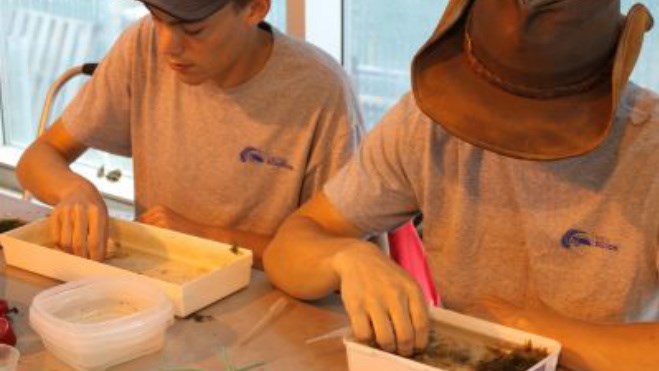The plan was to seed areas near affected lakes with milfoil weevils, insects native to Ontario that only eat milfoil. Between 2011 and 2013, the weevils were supposed to be placed near Simon, Hannah, Middle, St. Charles, Richard, McFarlane, Grant and Long lakes.
The program was based on a plan by EnviroScience, a U.S. company with extensive experience in cleaning lakes infested with milfoil. The company maps affected lakes ahead of time, determining the best spots to place the weevils so they will spread quickly and widely across the water.
The weevils feed on the milfoil, an invasive plant that spreads quickly, floats on top of the lakes, robbing other vegetation of sunlight.
The milfoil can devastate the native vegetation in lakes, clog intake tubes used to draw water for homes in the area, and makes boating nearly impossible in some spots. It likely arrived in the area attached to MNR planes, and is especially damaging to shallow lakes.
However, the initiative in Sudbury was hampered by several factors. Simon Lake was beset by blue-green algae growth, meaning no weevils could be seeded there in 2013. Other long-term studies already being done on Hannah and Middle lakes meant they had to be dropped from the list entirely. And the $155,000 budget limited how much could be done. In the end, the Alliance said only St. Charles Lake showed a significant drop in milfoil density.
“We are disappointed that control sites (necessary for comparison of data) were stricken from the original plan in order to meet the budget,” the Alliance said in its official response.
At city council Tuesday, Flowers said the group was determined to keep up the effort, despite the mixed results.
“We were kind of heartbroken, because we wanted those weevils to destroy the milfoil,” she said. “We didn't get it, but there are some positives.”
Last month, Stephen Butcher, the chair of the Long Lake Stewardship committee, publicly blamed city staff, particularly for the Long Lake results. Butcher said the weevils were seeded in the wrong areas and at the wrong times.
While recommending changes – such as better communication with stewardship groups, “when choosing sites and the ultimate choices, and reasoning should be communicated to the stewardship group” – Flowers said they are proud to have been part of the project, and want to maintain its partnership with the municipality.
“We wouldn't have a undertaken a project like this without the city,” she said. “Did it work perfectly? No. But it wouldn't have happened without the city.”
The plan for 2014 is to monitor milfoil and weevil densities in the lakes, assess where they're at and come up with a new plan. Public education is also key, and there are calls for banning the use of motorboats on lakes where the weevils have been seeded, since the motors can damage weevil breeding areas.
Stephen Monet, the city's head of environmental planning initiatives, said the ultimate goal is to reduce milfoil to manageable levels, where it doesn't choke off native plant life.
“It's not so much about eradication,” Monet said. “It's really about control.”
And residents can play a role by doing what they can to preserve lake quality. Among other things, that means ensuring they don't put things in the lake that will cause more problems.
“People who dump aquariums into the lake should not be doing that,” Monet said.
Ward 2 Coun. Jacques Barbeau said the disappointing results should be kept in context of the longer-term efforts to deal with the milfoil.
“We shouldn't deem this a failure – in fact, just the opposite,” he said. “We shouldn't look at this as the end, we should look at it as a beginning.”
Mayor Marianne Matichuk said too many residents take a cavalier attitude toward taking care of lakes.
“It's unfortunate that people view them as dumping grounds,” she said. “It takes a long time for (those lakes) to come back.”
Join Sudbury.com+
- Messages
- Post a Listing
- Your Listings
- Your Profile
- Your Subscriptions
- Your Likes
- Your Business
- Support Local News
- Payment History
Sudbury.com+ members
Already a +member?
Not a +member?
Sign up for a Sudbury.com+ account for instant access to upcoming contests, local offers, auctions and so much more.
